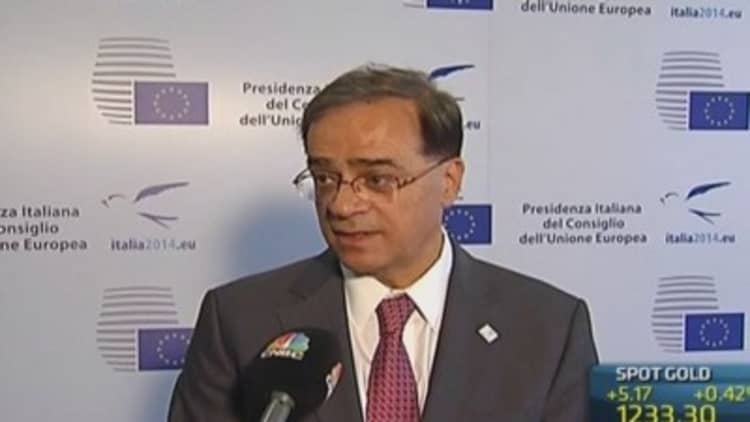
Policymakers at the heart of the Greek government went on the offensive this weekend, stating that the struggling euro zone nation would not need a further loan from its partners in the region and predicting a return to growth with the help of foreign investment.
"We expect that we are going to see positive growth for the first time in the third quarter," Gikas Hardouvelis, Greece's finance minister told CNBC at a meeting of euro zone officials in Milan.
The country was one of the first in Europe to be hit by the global financial crisis of 2008 and the full scope of its problems became apparent two years later. It helped spark the euro zone sovereign debt crisis. Greece needed to be bailed out by the rest of the euro zone and the International Monetary Fund, but now hopes to graduate from its loan program in 2016 without further assistance after six years of crippling recession.
Read More Will 2014 be the year Greece starts growing again?
"The (bailout) program did have benefits in the sense that lenders forced Greece to actually do structural reforms," Hardouvelis said. "(However) after a point one needs to do this on their own and to me structural reforms is something one ought to be vigilant (on) and the population has to own them."
His comments add to an interview with Prime Minister Antonis Samaras by Greece's Realnews newspaper on Sunday. Samaras said the country was beating its fiscal targets and would not need a third bailout from international creditors.
On Friday, Greece's credit rating was upgraded by Standard & Poor's and the ratings agency also forecast that the country's economy would start growing again next year. Revised data in early September showed that yearly GDP (gross domestic product) contracted by 0.3 percent in the second quarter. This continued an uptrend seen since the middle of 2010 and was also better than market expectations. The European Commission forecasts Greek GDP will rise by 0.6 percent this year and 2.9 percent in 2015. Some are less optimistic, with global consultancy EY expecting a contraction of 0.3 percent this year.
Unemployment in the country still remains near record highs of 27 percent, however, and consumer prices are continuing to show a contraction, which is known as deflation. Hardouvelis was adamant that the country wasn't currently experiencing deflation in this quarter and had actually wanted prices to decline previously so Greece could become more competitive.
Read MoreGreek debt upgraded to 'B' by S&P; Recovery 'weak'
"I don't expect deflation to stay there forever. Once expansion begins I think the deflation problem will go away," he told CNBC.
He also gave a bullish testament on foreign investment in the country and detailed the merits of privatization for some of the government's assets.
"We have seen that there is a lot of interest in the Greek ports, airports, other companies. People are lining up now to buy assets. We didn't have this experience earlier," he said.
"Now we have it. This is because investors do see there is only upside potential in the country. The economy has stabilized after a lengthy, lengthy recession of six years so their bet will succeed."



